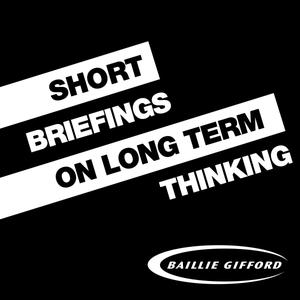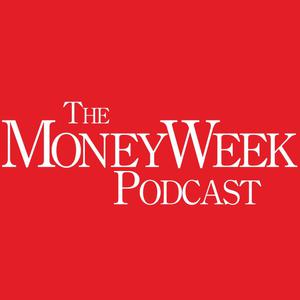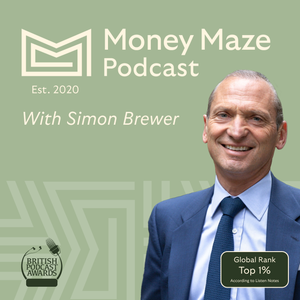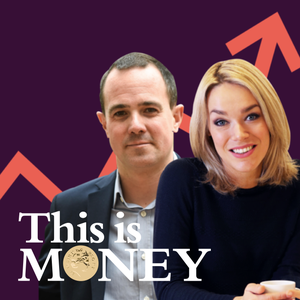
Short Briefings on Long Term Thinking - Baillie Gifford
Baillie Gifford
Short Briefings on Long Term Thinking - Baillie Gifford hosted by Baillie Gifford
- 25 minutes 31 seconds‘Ordinary’ but exceptional: firms leading the US’s infrastructure renaissance
The US’s transformational upgrade of its drainage, power and road networks is a long-term investment opportunity hiding in plain sight. In this podcast, Michael Taylor reveals some of the outstanding companies involved and makes the case that the markets have yet to fully appreciate the advantages working in their favour.
Background:
Michael Taylor is an investment manager in Baillie Gifford’s US Alpha strategy. In this Disruption Week briefing, he explains why years of neglect coupled with the destructive consequences of wild weather and our insatiable appetite for data-processing power have led the US to embark on a massive renewal of its physical infrastructure.
Taylor suggests that many of the companies creating long-term value benefit from supply advantages, which help them defend their commoditised products’ prices. These range from ownership of gravel quarries, which are difficult to get planning permission for, to the use of a gigantic, portable plastic drain-making machine.
In addition, Taylor discusses what a second Trump presidency might mean for the sector and why finding standout companies involves travelling off the beaten track.
Resources:
Building back: the great US infrastructure opportunity
Spotting the winners from the great US infrastructure renaissance
Companies mentioned include:
Timecodes:
00:00 Introduction
1:35 Exceptional businesses confronting an exceptional problem
3:20 The US v global infrastructure opportunity
4:35 Donald Trump’s second presidency
6:40 The benefits of patience
7:35 Wild weather
8:45 Investing in Advanced Drainage Systems
11:05 Labour shortages
12:15 Stella-Jones’s wooden telegraph poles
14:05 Tree-spotter specialists
16:15 Martin Marietta’s supply-side advantage
18:55 Recycled aggregates’ limitations
20:15 Finding US infrastructure investments
21:45 Comfort Systems USA and keeping datacentres cool
24:20 “Massive in terms of magnitude of spend and duration”
16 December 2024, 7:00 am - 28 minutes 20 secondsPrivate companies: backing tenacious trailblazers
Many of the world’s most exciting, high-growth and disruptive companies are private. Moreover, the entrepreneurs running them are typically keeping them private for longer before trading their shares on public stock exchanges – and in some cases have no plans to do so.
Baillie Gifford’s Private Companies Team seeks out exciting businesses and founders in this space to give our clients access to an increasingly important source of long-term growth. Taking a highly selective approach, it has invested more than $9bn across over 140 firms over the past 12 years. In this podcast, Alexander Nicolier explains how it does so and discusses some of our notable holdings.
Background:
Alexander Nicolier is an investment manager in our Private Companies Team. In this Disruption Week briefing, he reveals the scale of the opportunity and the increasing impact that the sector’s restless founders and their exceptional companies are delivering.
From SpaceX to Bending Spoons, Epic Games to ByteDance, one of the distinguishing features of these pioneering firms is that they’ve been able to choose their shareholders. Nicolier reveals why Baillie Gifford’s patient approach and reputation have helped make us a favoured partner.
He also reveals how deep research helps him and his colleagues embrace the uncertainty that can be involved with backing companies at an earlier stage of growth than many public market stocks. And he introduces some of his team’s most recent investments, including the immersive experience specialist Cosm and the next-generation computing company Tenstorrent.
Resources:
Baillie Gifford Private Companies hub
Private companies: investing in trailblazers
Companies mentioned include:
Timecodes:
0:00 Introduction
1:30 What’s often misunderstood about private companies
2:40 Relationship building in Brazil and Colombia
3:40 Why reputation matters
5:35 “Look out for a gringo”
6:30 Private markets’ scale
7:00 Our clients’ advantage
9:25 SpaceX and uncertainty
12:40 Dealing with setbacks
13:45 Bending Spoons’ business model
16:50 Cosm’s ‘shared reality’ experience
18:50 Tenstorrent and Jim Keller’s talent magnetism
20:20 The state of the IPO market
21:55 Why Epic Games has stayed private
25:00 Disney’s $1.5bn stake in Epic Games
26:40 “Too big to ignore”
9 December 2024, 7:00 am - 24 minutes 58 secondsWhy growth investors can’t ignore China
China is transitioning from a property-led economy to one focused on advanced manufacturing. It already leads the world in electric car production and the batteries that power them. And it’s also a growing force in renewables, robotics and biotech. Investment manager Helen Xiong discusses some of the growth companies involved, why concerns about overcapacity seem overstated and why rising trade barriers have implications for stocks traded inside and outside China.
Background:
Helen Xiong is an investment manager in Baillie Gifford’s Global Alpha Team and recently became joint deputy manager of The Monks Investment Trust. In this episode of Short Briefings on Long Term Thinking she discusses why global growth investors can’t ignore China even if they don’t directly own stakes in any of its companies.
She describes how the country has made ‘advanced manufacturing’ a strategic priority, laying the foundations for future growth. This has already yielded results, with companies such as the electric vehicle maker Li Auto and battery producer CATL creating long-term value for shareholders – with the prospect of more to come.
Xiong suggests that ‘rising trade barriers’ are one consequence of Western nations’ seeking to protect domestic industries and discusses how she takes this into account when deciding which companies to back. In addition, she considers the implications of Chinese retaliation and what that might mean for some of the US and Europe’s leading exporters.
Xiong also shares her view on recent stimulus by the Chinese central bank and government agencies, focusing on signals of a shift that could create long-term shareholder value.
Resources:
China: finding the new shoots of growth
Jonathan Haidt: The Righteous Mind – Why Good People are Divided by Politics and Religion
More from Helen Xiong:
Beyond NVIDIA: investing across the semiconductor ecosystem
Global Alpha Investor Forum 2024
Companies mentioned include:
Timecodes:
00:00 Introduction
1:30 The advantage of being Chinese, African and European
3:00 Relationships v individualism
5:15 China’s post-Covid economy
7:00 Why China matters to global investors
8:30 Overcapacity: a feature, not a bug
10:15 Brutal competition
10:55 Investing in Li Auto
13:45 Li Xiang’s attention to detail
14:30 The car industry’s iPhone moment
16:25 Trade tariffs
18:20 Potential Chinese retaliation
19:35 Chinese regulators
20:35 Stimulus
21:35 Focusing on long-term shareholder value
22:20 Book choice
23:45 Conclusion
10 October 2024, 2:27 pm - 29 minutes 49 secondsCapitalising on change: Japan’s growth champions
Upheaval can create opportunity. Baillie Gifford’s Japan Team seeks out companies that will derive the greatest long-term benefit from transformational forces impacting business and broader society. In this podcast, investment manager Matthew Brett identifies four ‘structural growth’ drivers and the portfolio companies taking advantage of them.
Background:
Matthew Brett is the investment manager of The Baillie Gifford Japan Trust and our Japanese Fund, as well as co-manager of the Japanese Income Growth Fund. In this episode of Short Briefings on Long Term Thinking he discusses four forces creating long-term growth opportunities:
- Japan’s late embrace of digitalisation
- the rising spending power of its Asian neighbours
- the accelerated adoption of industrial automation
- the unmet health needs of an ageing population
Brett also names some of the Japanese companies driving these changes or otherwise gaining advantage, including ecommerce conglomerate Rakuten, skincare beauty firm Shiseido, machine vision specialist Keyence and Alzheimer’s drug developer Eisai.
Resources:
Kohei Saito: Slow Down – How Degrowth Communism Can Save The Earth
Companies mentioned include:
Timecodes:
00:00 Introduction
1:45 From psychology to investment
2:25 Changing Japan
3:15 Japan’s distinguishing market characteristics
4:15 Visiting companies and other equities research
6:00 Performance versus the TOPIX
8:00 Defining digitalisation
8:30 Leaving paper behind
10:15 Rakuten’s online enterprise
10:50 The advantage of QR barcode payments
11:30 Rakuten’s loyalty points scheme
12:25 Accelerating automation and industrial robots
13:30 DMG Mori’s precision machines
14:40 Keyence and robotic vision
16:40 China’s chance of catch-up
17:40 Rising wealth of Japan’s Asian neighbours
19:00 Shiseido’s skincare advantage
20:10 Unmet healthcare needs of an ageing population
21:30 Testing further uses for Eisai’s Alzheimer’s drug
23:30 PeptiDream’s synthetic peptides
24:00 Using AI to put peptides to use
25:10 Calbee’s continued innovation
26:00 Book choice
28:50 Conclusion
29 August 2024, 8:00 am - 34 minutes 30 secondsThe efficiency effect: how four companies shaped up for a new era
Sometimes, you have to take a step back to leap forward. Over the past couple of years, Meta, Amazon, Block and Shopify are among the growth companies to have made efficiency cuts following the pandemic. Gary Robinson, an investor in Baillie Gifford’s US Equity Team, says that’s made them more agile and resilient – qualities that will let them take advantage of artificial intelligence and other opportunities to drive long-term growth.
Background:
Gary Robinson is joint manager of the Baillie Gifford US Growth Trust, a manager of the American Fund and a partner in our firm. In this episode of Short Briefings on Long Term Thinking, he explores how four leading internet-focused firms have streamlined their operations and reallocated resources to become more adaptable during a period of rapid change.
Robinson draws a parallel with companies that made cutbacks after the global financial crisis to suggest that the markets may have underestimated how much growth can be unlocked by leaders taking a hard look at their firm’s spending, organisational structure and business priorities.
Robinson suggests that recent efficiency drives will help Shopify, Meta and Amazon pursue AI-related opportunities that could meaningfully increase their earnings. And at Block, efforts to bring two products closer together could help the firm challenge Visa, Mastercard and American Express.
Resources:
Behind The Tech: Tobi Lütke: CEO and Founder, Shopify
Dwarkesh Podcast: Mark Zuckerberg – Llama 3, Open Sourcing $10b Models & Caesar Augustus
Bent Flyvberg: How Big Things Get Done
Cyril Northcote Parkinson: Parkinson’s Law, and Other Studies in Administration
More from Gary Robinson:
Lessons from evolutionary biology
Why companies should embrace chaos
Companies mentioned include:
Timecodes:
00:00 Introduction
01:40 A background in biochemistry
02:55 The appeal of American companies
03:30 Parallels with the global financial crisis
04:40 Post-Covid efficiency efforts
06:25 Addressing overhiring and patched-together processes
07:40 Future-proofed businesses
08:00 The potential of AI
08:10 Shopify and the distraction of side quests
10:45 Shopify’s Sidekick assistant
12:50 Engineering Shopify’s internal operations
14:20 The authority of founder-leaders
16:00 Meta’s ‘year of efficiency’
18:00 How AI can drive further growth at Facebook and Instagram
20:10 Business chatbots on WhatsApp and Messenger
21:15 Investing in Block
22:30 Capping employee numbers without compromising growth
24:40 Square and Cash App’s potential to rival Visa and Mastercard
26:35 Meeting Jack Dorsey
27:40 Discipline and focus at Amazon
29:00 Amazon’s fast-growing advertising business
30:20 Generative AI’s trillion-dollar opportunity for AWS
31:25 Offloading routine tasks to artificial intelligence
32:25 Book recommendation
33:40 Outro
4 July 2024, 8:00 am - 28 minutes 14 secondsWhy emerging markets have changed
Emerging markets have sometimes promised more than they have delivered, but circumstances may be tipping in growth investors’ favour. Will Sutcliffe, head of our Emerging Markets Team, explains why it’s an opportune time to invest in the asset class.
Background:
Will Sutcliffe is the head of Baillie Gifford’s Emerging Markets Team and co-manager of our Emerging Markets Leading Companies Fund. In this episode of Short Briefings on Long Term Thinking, he brings his 23 years of experience in the field to explain what makes the specialism different from other types of growth investing.
He makes the case that finding exceptional growth companies at attractive valuations is only part of the equation. Investors must be mindful of the broader macroeconomic environment, he explains, to avoid getting caught out by currency swings or spiralling debt costs. This leads him to conclude that recent resilience in emerging market economies could point to a favourable outlook for the asset class’s growth stocks.
All this only matters to our portfolios if there are exceptional businesses to invest in, and Sutcliffe argues that the emerging markets are home to an increasing number of world-class companies. They range from the Taiwanese chip maker TSMC to the energy, retail and telecoms conglomerate Reliance Industries.
Resources:
South-east Asia’s rising export stars
Gabriel Garcia Marquez: Until August
Timecodes:
00:00 Introduction
01:45 Joining the Emerging Markets Team
03:15 A ‘terrifying’ baptism of fire
05:00 Emerging markets’ ‘dirty little secret’
05:45 Qualifying for emerging markets status
06:45 Higher-calibre companies
08:00 Macroeconomic resilience
09:30 US-China tensions and Russia’s invasion of Ukraine
12:00 Investing in China
13:45 PDD Holding’s Pinduoduo and Temu
15 April 2024, 10:14 am - 27 minutes 19 secondsThe weight-loss drug with huge growth potential
A new medicine that can help patients lose 15 per cent of their body weight could have far-reaching consequences for healthcare. Wegovy mimics a hormone the gut releases, reducing appetite and slowing digestion to delay hunger’s return. Research is also underway into other potential health benefits.
In this podcast, Baillie Gifford investment manager Ross Mathison discusses its maker, the Danish pharmaceuticals manufacturer Novo Nordisk, which became Europe’s most valuable company in 2023.
Background:
Ross Mathison is an investment manager in our Global Income Growth Team, co-manager of our Global Income Growth Fund and deputy manager of the Scottish American Investment Company (SAINTS).
In this episode of Short Briefings on Long Term Thinking, he discusses how medicines that mimic the glucagon-like peptide-1 (GLP-1) hormone could help tackle the growing problem of weight gain. Forecasts suggest that by 2035, more than half the world’s population will either be overweight or obese. That’s likely to lead to more people suffering associated diseases, putting health budgets under further strain.
Novo Nordisk initially researched GLP-1s as a diabetes treatment. The company is the world’s biggest insulin producer, but it’s the release of its weight-loss drug Wegovy that’s transformed its growth prospects. News that medical trials suggest that the therapy could also reduce the likelihood of heart attacks, strokes and other cardiovascular threats among some patients has driven further investor interest.
Mathison explains that there could be further health benefits beyond this, how even more effective treatments could follow and why Novo Nordisk’s manufacturing edge and connection to the world’s biggest charitable foundation bode well for its future.
Resources:
New England Journal of Medicine: Semaglutide trial
Novo Nordisk cardiovascular trial press release
Novo Nordisk kidney trial press release
World Health Organization obesity factsheet
Timecodes:
00:00 Introduction
1:40 What are GLP-1s?
4:00 Scientific breakthrough
5:05 Obesity: a disease, not a choice
6:45 Novo Nordisk’s drug, Wegovy
08:10 Prescription costs
7 February 2024, 10:00 am - 28 minutes 34 secondsThe 3 characteristics of great growth companies
What distinguishes companies that will thrive from those that will perish? In this episode, we explore three traits that mark out the companies set to surge ahead from those more likely to struggle:
1. They solve real-world problems
2. They are financially strong and disciplined
3. They are highly adaptable
Baillie Gifford partner Tim Garratt discusses these characteristics, gives examples of companies that exhibit them and explains why this feels like a once-in-a-generation opportunity to be a long-term growth investor.
Background
Tim Garratt is an investment specialist, overseeing the institutional clients who invest in our Long Term Global Growth strategy and leading our broader client specialist network.
He recently co-authored the paper Why growth, why now?, which reaffirms our beliefs about how growth investing can generate attractive returns.
In this episode of Short Briefings on Long Term Thinking, he discusses how interest rate rises, restricted amounts of capital and geopolitical tensions are causing a stock market shake-out. And he explains why this plays to the advantage of patient investors who focus on the fundamentals when picking growth stocks.
Garratt gives examples of how companies, including Netflix, Roblox, Shopify and Amazon, fulfil the criteria we seek. And he explains how Baillie Gifford itself is adapting to the times, exploring the use of machine learning and other tools to hone our investment process.
Resources:
We’re all climate hypocrites now
Timecodes:
00:00 Introduction
1:30 From abundance to limitation
03:45 Implications for investors
05:20 Real world problems: supply chains
07:30 Deere and hi-tech farming
09:00 Financial strength and discipline
09:50 Netflix and pricing power
12:00 Keeping watch on margins
14:15 China’s electric vehicle makers
16:15 Adaptability and new business models
16:50 Roblox adds AI
19:30 Microsoft, Amazon and environmental costs
21:45 Sea and the importance of culture
23:00 How Baillie Gifford is adapting
25:05 ‘Why now?’ for growth investing
26:55 Book choice
12 January 2024, 9:00 am - 26 minutes 51 secondsThe Amazon way: mixing ones and zeros with nuts and bolts
Show notes
Amazon and DoorDash take different approaches to bridging the physical and digital worlds. Amazon has built an extensive infrastructure of warehouses, logistics networks and data centres to directly control its operations. DoorDash instead relies on partnerships with restaurants and stores for deliveries, limiting its capital investment. In this podcast, Baillie Gifford investment manager Kirsty Gibson analyses the advantages of each model and how both approaches can pose a disruptive challenge to more traditional businesses.
Amazon and DoorDash exemplify two distinct approaches to rooting a business in both the physical and digital worlds. Amazon has done so by investing deeply in physical infrastructure, including its vast logistics operations and data centres. DoorDash, by contrast, has focused on partnering with others to offer meal and grocery deliveries. Baillie Gifford investment manager Kirsty Gibson explores the merits of each approach and discusses how the two companies and others like them can pose a disruptive challenge.
Background
Kirsty Gibson is an investment manager in Baillie Gifford’s US Equity Growth Team and is joint manager of the American Fund and US Growth Trust.
In this episode of Short Briefings on Long Term Thinking, she explores how a growing number of companies are posing a challenge to incumbents by innovating in both the digital and physical realms. The podcast draws on an interview she gave as part of Baillie Gifford’s Disruption Week 2023 event.
In addition to discussing how Amazon and DoorDash put this into practice, Gibson also discusses the chemicals maker Solugen, self-driving lorries pioneer Aurora and electric car maker Rivian, among others.
Resources:
Disruption Week 2023 articles and videos
Growth waves: supporting companies and spotting opportunities
Timecodes:
00:00 Introduction
1:30 Historical background
4:21 Capital-intensive and capital-light approaches
5:31 How Amazon blends its physical and digital operations
8:33 Rivian’s electric pickup trucks
9:57 Solugen: making chemicals with software
13:39 DoorDash’s capital-light approach
15:45 DashMart distribution centres
17:28 Aurora’s autonomous trucking business model
20:30 Reinvesting in Meta
23:25 Investing with conviction
24:18 Ginkgo Bioworks’ potential
Follow us via:
Companies mentioned include:
15 December 2023, 10:32 am - 26 minutes 45 secondsBeyond China: south-east Asia’s next export stars
China became known as the world’s factory thanks to it offering companies a way to manufacture all kinds of goods at a high quality and relatively low cost. But in recent years, south-east Asian nations, including Vietnam and Indonesia, have begun challenging it for that status. Baillie Gifford investment manager Ben Durrant recently returned from a tour of the region. He discusses some of the long-term growth opportunities he unearthed on his trip.
Background
Ben Durrant invests on behalf of the Pacific Horizon Investment Trust, the Pacific Fund, and our Emerging Markets Equity Team. In this latest episode of Short Briefings on Long Term Thinking, he explores the factors that led China to become the world’s leading exporter and how its move up the value chain is now creating opportunities for other south-east Asian countries to grasp. Durrant reviews some of his most memorable encounters in Vietnam, Indonesia, Malaysia and Thailand and reveals which growth companies excited him the most. They include businesses using mined metals to make car batteries, banks serving populations with growing spending power and, perhaps surprisingly, one of the world’s leading catfish exporters.
Resources:
The Indonesian companies powering the green transition
Timecodes:
00:00 Introduction
01:30 China’s success as a low-cost exporter
03:15 Land reform’s role
04:00 Good quality, low-cost labour
05:45 South-east Asian countries’ advantage
07:15 Vietnam’s growth opportunity
09:30 Vin Hoan: exporting catfish
11:45 Sourcing local insights
13:30 Indonesia’s move up the value chain
16:15 Clusters of expertise in Malaysia
18:00 Looking beyond tourism in Thailand
20:15 Moving up the value chain
22:15 The attraction of growth investing in southeast Asian
23:15 Paying attention to macroeconomics
24:30 Book recommendation
Follow us via:
Companies mentioned include:
1 December 2023, 9:00 am - 21 minutes 7 secondsJapan: a new dawn for growth investing
Is the time ripe for Japanese growth stocks? Donald Farquharson is Baillie Gifford’s head of Japanese equities and knows the market better than most. In the latest episode of Short Briefings on Long Term Thinking he draws on a recent visit to the country to explain why conditions seem favourable for a cohort of domestic companies with long-term mindsets.
Background
There’s a sense of renewed confidence and enthusiasm in the air in Japan. The country is home to the world’s second-largest market for equities after the US, but it doesn’t get a corresponding degree of attention from international investors.
The reason is partly because of the nation’s past weak economic performance. But a recovery is underway, and critically, many of its growth stocks have strong balance sheets, big ambitions and a positive story to tell.
In this episode, Baillie Gifford partner Donald Farquharson draws on his experience of investing in Japan since 1990 to explain why he’s particularly optimistic about the opportunities ahead for a select group of companies. They include the medical equipment maker Olympus, the car components manufacturer DENSO and the takeover advisory service Nihon M&A Center.
He also shares why he thinks some misunderstand Japan and why it’s no coincidence that many of the companies he backs are founder-run.
Resources:
Discovering the unsung superstars of Japanese technology
From Yahoo! to Z Holdings: the evolution of an online pioneer
Japan: the small businesses with big opportunities
Investing in Japan: distance lends perspective
Donald Farquharson’s LinkedIn page
Aiming High: Masayoshi Son, Softbank Group and Disrupting Silicon Valley
Timecodes:
00.00 Introduction
01:40 Investing in Japan in the 1990s
03:00 ‘Undiscovered’ Japan
03:55 How banks and other businesses changed
05:30 A sustainable recovery?
06:45 An exciting time for growth companies
07:45 Strong balance sheets
08:15 Olympus and endoscopes
09:45 Diversity on the board
11:00 Nihon M&A Center and company takeovers
12:50 DENSO, a major supplier to Toyota and others
14:30 Toyota City, home to one million people
15:35 Competition for car batteries
16:30 Baillie Gifford’s advantage in Japan
17:45 Looking beyond the headlines
18:20 Book recommendation: Masayoshi Son and Aiming High
19:45 Investing in founder-led firms
Follow us via:
Companies mentioned include:
8 November 2023, 10:32 am - More Episodes? Get the App
Your feedback is valuable to us. Should you encounter any bugs, glitches, lack of functionality or other problems, please email us on [email protected] or join Moon.FM Telegram Group where you can talk directly to the dev team who are happy to answer any queries.
 The MoneyWeek Podcast
The MoneyWeek Podcast
 AJ Bell Money & Markets
AJ Bell Money & Markets
 Money Maze Podcast
Money Maze Podcast
 Money Clinic with Claer Barrett
Money Clinic with Claer Barrett
 Investors' Chronicle
Investors' Chronicle
 This is Money Podcast
This is Money Podcast